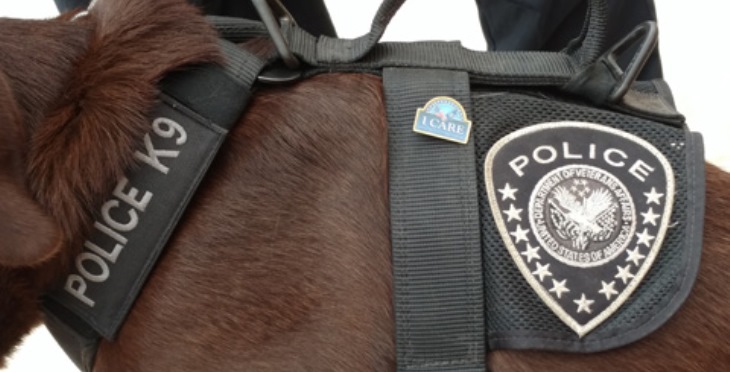This post first appeared on the Greater Los Angeles Health Care System website.
Cuddling up to this friendly furry creature is encouraged, especially if you’re in need of smiles. He is a softy on the outside, but inside, he has a heart of lion and is dedicated to serving and protecting Veterans and staff at VA Greater Los Angeles Healthcare System.
Bruno, a one-year old Chocolate Labrador, is the newest addition to the facility’s police department. Bruno’s nose and ears can detect what the average human’s senses are unable to see or smell. When a patient is lost, for example, Bruno can help VA Police officers find that individual.
“Bruno can pick up scents or hear the missing patient faster than people and with less resources,” said VAPD K-9 Sergeant Ronald O’Bannon. “If someone were seen running into heavy shrubbery or wooded areas, VA police can dispatch Bruno to find them.”
Locating suspected narcotics on the grounds or in patient’s living quarters is another one of Bruno’s expertise. His training and keen sense of smell can assist medical staff and VA police trace hidden drugs that were missed during a visual inspection of a patient’s room.

Bruno, a one-year old Chocolate Labrador and his handler Sgt. Ronald O’Bannon at VA West Los Angeles Medical Center.
“Bruno’s talents add an extra level of security and safety Veterans appreciate, especially those receiving drug and alcohol addiction treatment and want to live in a sober, clean and drug free environment.”
O’Bannon, Bruno’s trusted handler, served five years in the U.S. Coast Guard as a tactical law enforcement officer dog handler. After separating from the military and serving as a civilian in the Department of Defense and VA Police Department Las Vegas, he accepted a position at VA’s Greater Los Angeles Health Care System to take part in the medical center’s inaugural K-9 program.
“The dog itself, everywhere we take[him], everywhere we go, you can see that connection,” said Captain Alfred Montero, the K-9 program manager. Bruno help “brings us together; Veterans understand the police and, we understand the Veterans.”
Bruno has already made a difference deterring illegal activity in the short amount of time he’s been on station.
“I’ve been here for 23 years so I’ve known some of the Veterans for a long time and I continue to see some of them here, but, they’re trying. I think the dog is going to make a big impact on their life and maybe this will be the one deciding factor where they’ll be able to make it and overcome their drug addiction.”
The Bruno and O’Bannon duo is the first of two K-9 units assigned to the health care system. Oscar, a German short-haired pointer and his handler, Lieutenant Ralph Garcia, will join the program in November after completing K-9 law enforcement training in Riverside, California.
Once they arrive at the medical center, handlers are responsible for the care of their K-9, and that includes regular training sessions, feedings, grooming, baths and of course clean ups. Despite the extra after-hours of care, VA’s K-9 handlers enjoy their job and know their work is improving the lives of service members at the VA.
“When Veterans come up to me and say ‘Thank you, I appreciate you coming over here,’ that instant gratitude from staff as well as Veterans is the most rewarding thing about my job,” said O’Bannon.

Topics in this story
More Stories
Veteran Byron Potier weighed almost 300 pounds and was tired and lethargic. He was the perfect candidate for gastric sleeve surgery.
How much do you know about VA care, benefits and services? Don’t miss out on what you've earned—check out the "2025 VA Federal Benefits Guide for Veterans, Dependents, Survivors, and Caregivers" handbook to learn more.
Feeling stressed? Your breath can help you relax and focus. Take 3 minutes to reset and prioritize your well being for this week's #LiveWholeHealth practice.







So, the veterans have to be threatened with a vicious dog attack; the real question should be is: Why are the VA’s standard one-size-fits-all alcohol/drug treatment protocols (always mandatory “Jesus Saves” proselytizing and 12-Step religious AA/NA cult indoctrination) failing so many of the veterans?